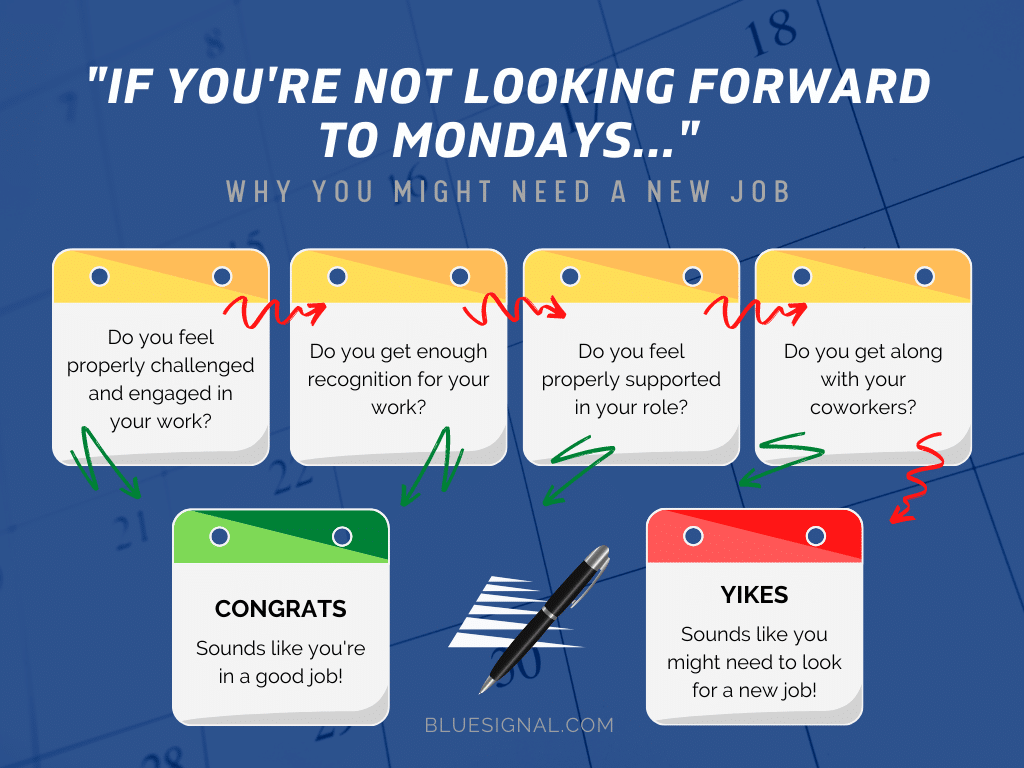Receiving unexpected LinkedIn messages from a recruiter can spark all kinds of feelings. On the one hand, you may feel flattered that someone thinks you are well-qualified for a position they are trying to fill. However, on the other hand, you may also feel nervous about responding, or annoyed because you have a great job, and your inbox is flooded with similar LinkedIn messages. You could even feel conflicted about whether to reply at all, and if so, how you would go about crafting a response.
Recruiters – including our top-notch team at Blue Signal – spend a lot of time reaching out to potential candidates. In fact, 77% of recruiters use LinkedIn messages for recruitment purposes, making it the most-used channel. Even though they are somewhat used to people not responding to their messages, it’s always a good idea to at least respond. As a job seeker, it’s imperative to understand the benefits of responding to recruiters’ LinkedIn messages and what to say to stand out from the crowd.
LinkedIn Messages Have Low Risk, High Reward Potential
Responding to recruiters’ LinkedIn messages politely, whether interested or not, only takes a couple seconds. A quick reply is less burdensome than a phone call, and let’s be honest, we are already replying to hundreds of texts and instant messages a day. So, what’s one more? LinkedIn even provides short responses for both showing interest and politely declining. However, we suggest you take it one step further and set up these templated responses to LinkedIn messages as "Quick Replies," saving you even more time.
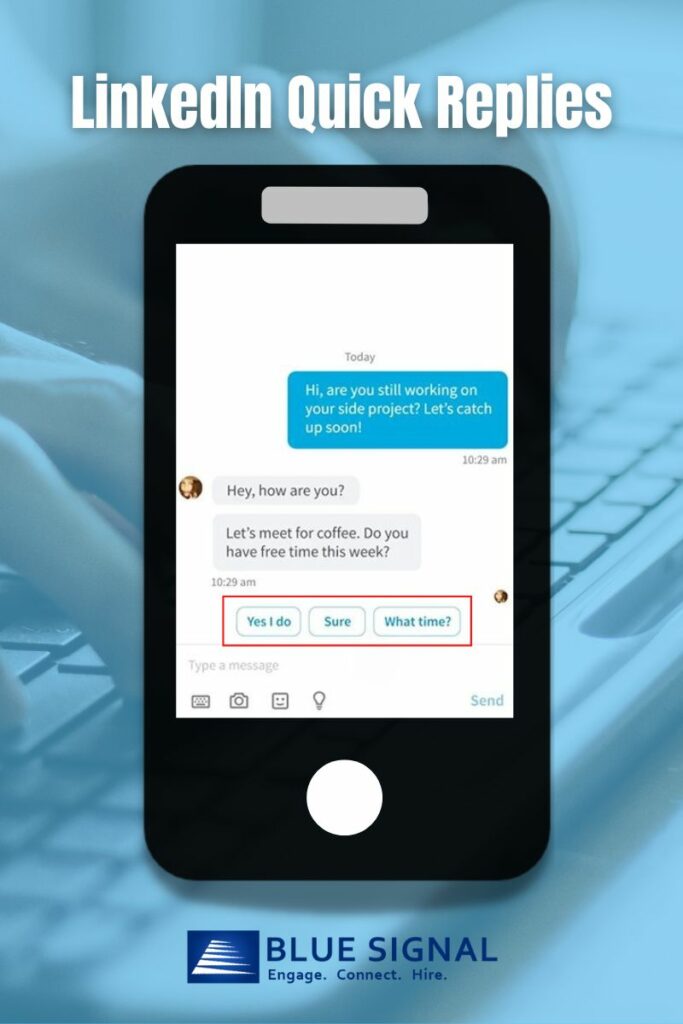
Not only does responding to a recruiters’ LinkedIn messages take virtually no time, one of the main benefits is that it is also a free service to you! Recruiters are paid by the hiring companies to help place candidates into their open roles. Recruiters aren’t trying to swindle you; they really want to see you happy in your career. Which means their focus is finding the perfect pairing both for you and the hiring company.
In fact, their paycheck might depend on it. The job of the recruiter is to source candidates on behalf of the client, and they are typically paid a percentage of the first-year salary for managing all sourcing and screening. Recruiters like those at Blue Signal work through a placement guarantee. Meaning, if you quit or don’t like your job, they don’t get paid! This is even better news because they have a stake in the game. Recruiters will go to bat for you to get the salary and compensation you deserve. It’s literally a mutually beneficial effort for them to get you a better paying job!
Recruiter LinkedIn Messages are a Networking Opportunity
Getting a LinkedIn message from a recruiter is actually great news! After a recruiter has sought you out, and you’ve replied professionally and politely, you can leverage the recruiter’s expertise as a dynamic networking tool of your own. Even if the role they initially contacted you about doesn’t work out, connecting with a recruiter can have several long-term advantages. Replying to recruiters’ LinkedIn messages creates a positive first impression that may make them more inclined to think of you down the road. You are likely to stick in their mind if you let them know you’re not currently interested but are open to other opportunities. This puts yourself in a position to have exclusive access to future open positions. In the interim, the recruiter can potentially be a valuable resource for resume review, interview preparation, and LinkedIn profile optimization tips and tricks. They are experts in the hiring industry and have unique insights into exactly what hiring managers are looking for that are sure to benefit you long-term as your career progresses.
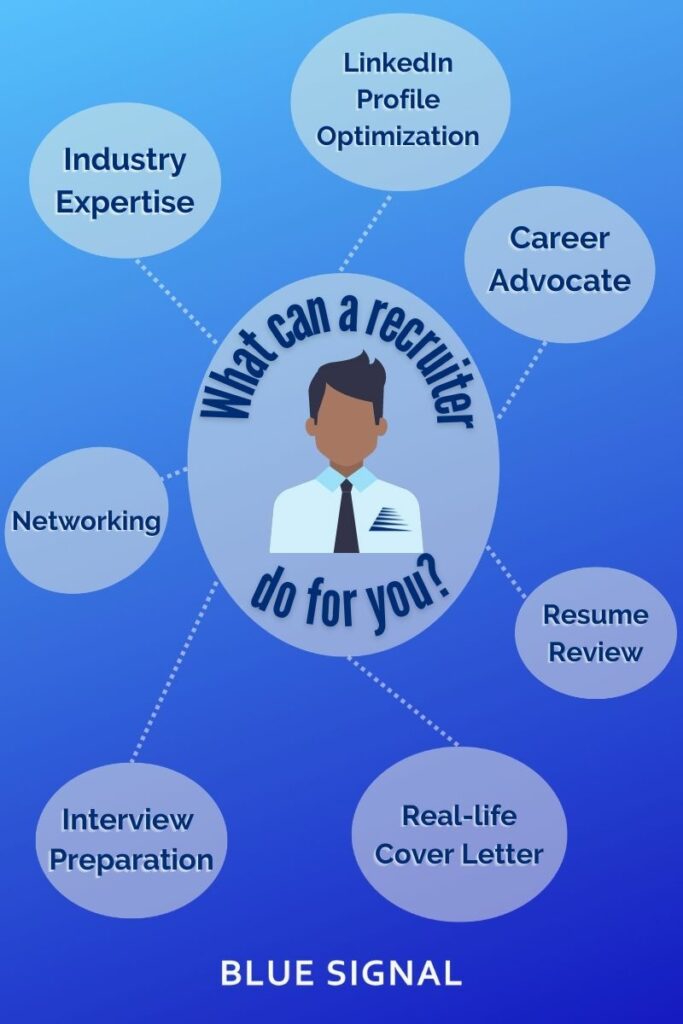
Another great way to remain connected to a recruiter if you aren’t interested in an opportunity is to refer colleagues. If you are not interested, or don’t fit for the role the recruiter is trying to fill, offering them a referral from your own network is sure to keep you at the top of the recruiter’s mind for future opportunities. Keeping your network in mind could turn into a huge opportunity for someone you know! It’s in our human nature to want to help people, and those you help will be more inclined to return the favor in the future. This generates good will between you and the recruiter and reflects well on your professionalism and willingness to help others as a potential candidate.
Recruiters are Your Personal Career Advocate
They say reputation is everything, and a recruiter will ensure that yours works for you. A recruiter will be your partner in helping to sell your skills and talents to a potential employer. Because recruiters have already established a trusting relationship with hiring managers they work with, their word carries a lot of weight. The recruiter’s vote of confidence can be especially important if you are making a switch to a new career or industry. A recruiter can act as your real-life cover letter! You have someone that can vouch for your transferable skills and abilities, even if they don’t exactly align with the job description.
Take for instance your next career move. Perhaps you received an offer and wondered whether it was fair. You aren’t alone! Most candidates aren’t quite sure of their market value. But as someone with a recruiter in your network, you have an Ace in your back pocket. Your recruiter can advocate for you throughout the hiring process by helping you to assess and negotiate for appropriate compensation. Because recruiters work in this field every day, they have the market knowledge to ensure that you get the offer you deserve and will work with the potential employer to do so. As the middleman, you can be direct with your recruiter about what you want, and they can help you be able to frame that in an appropriate way when making negotiations about the job offer.
How to Respond to Recruiter LinkedIn Messages
Now that we have addressed all the benefits of working with a recruiter, let’s discuss how to respond to recruiters’ LinkedIn messages appropriately and effectively. It is crucial to keep in mind that your first impression with a recruiter is also your first impression with the hiring company. You will want to treat all of your conversations with recruiters as if they are interviews with the hiring company because, to an extent, they are. This means maintaining a professional and positive demeanor throughout your communication, whether it is via LinkedIn messages or another method. Recruiters are more likely to move you forward in the process if they are confident that you will treat a hiring manager in the same manner.
Also, it is important to be courteous and respectful. After all, “treat others the way you want to be treated” is the golden rule for a reason. Like anyone, recruiters want to work with people they like. Treat recruiters with respect and be polite when interacting with them. Be respectful of recruiters’ time by keeping communications brief and do not overwhelm them with constant LinkedIn messages, emails, and phone calls. You’d want to receive the same courtesy, and you never know how valuable a connection can be!
Here are some examples of how you can respond to recruiters’ LinkedIn messages to help get you started:
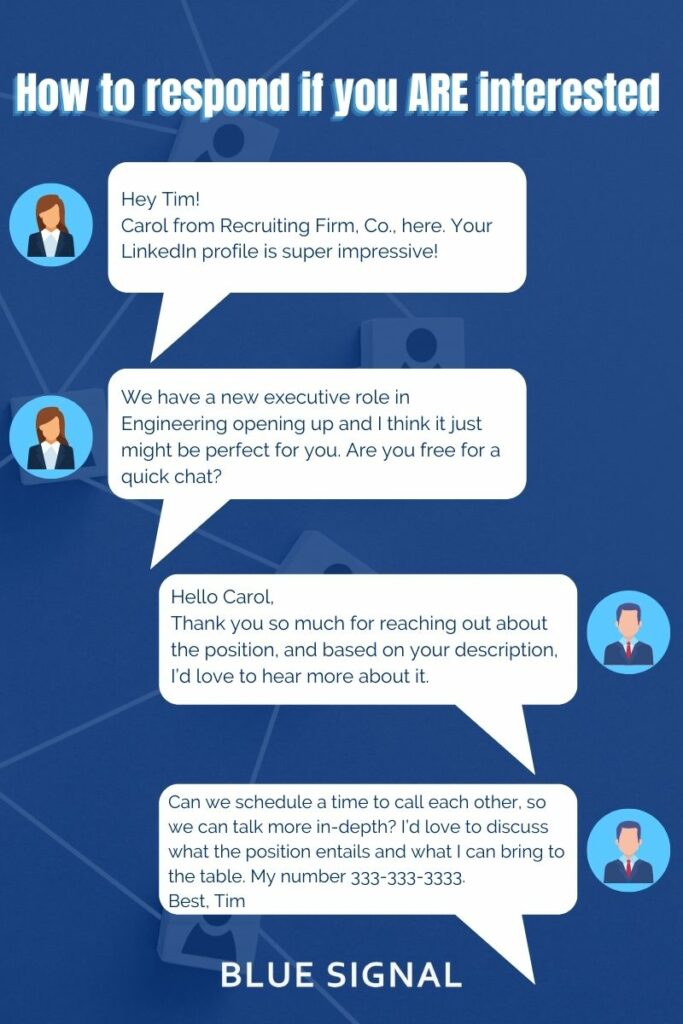
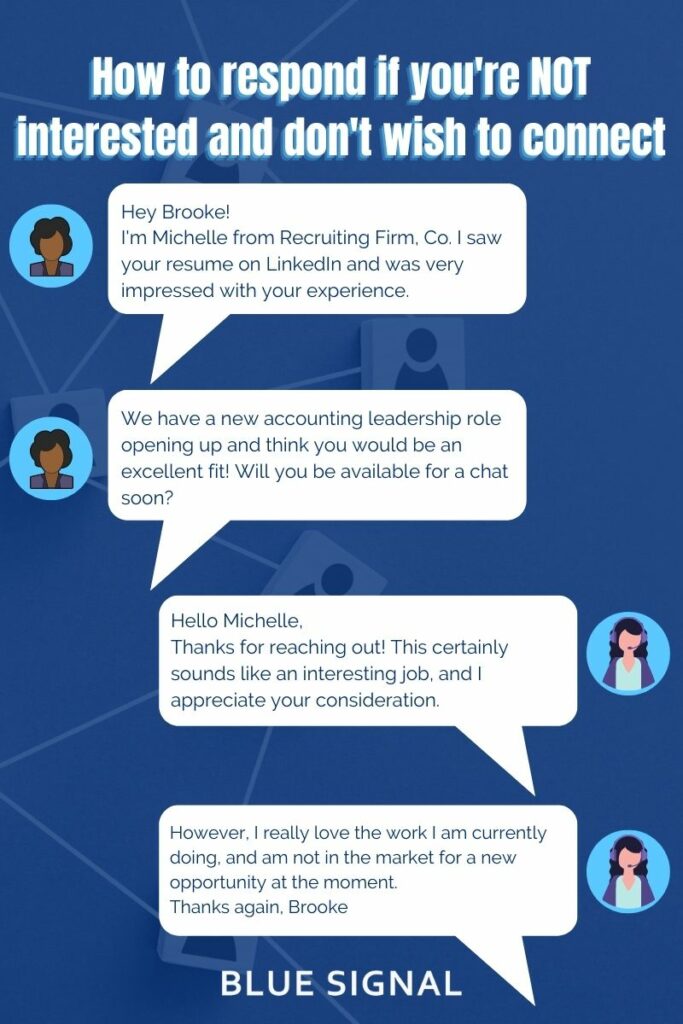
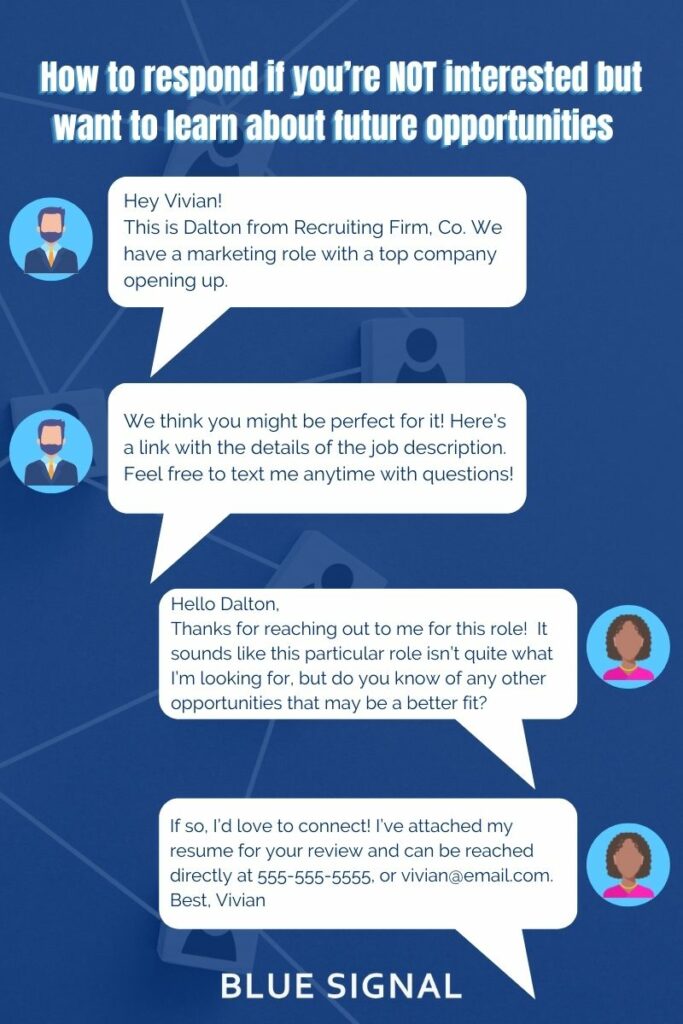
Although responding to recruiters’ LinkedIn messages may seem like a daunting task, the benefits of responding greatly outweigh any drawbacks. A recruiter can serve as an expert in the field, your biggest career advocate, and an addition to your professional network all at zero cost to you! Blue Signal is here to help; as your partners in the hiring process, we advocate for the best of the best for each of our candidates. To get started, and see your own career’s potential, contact us today.
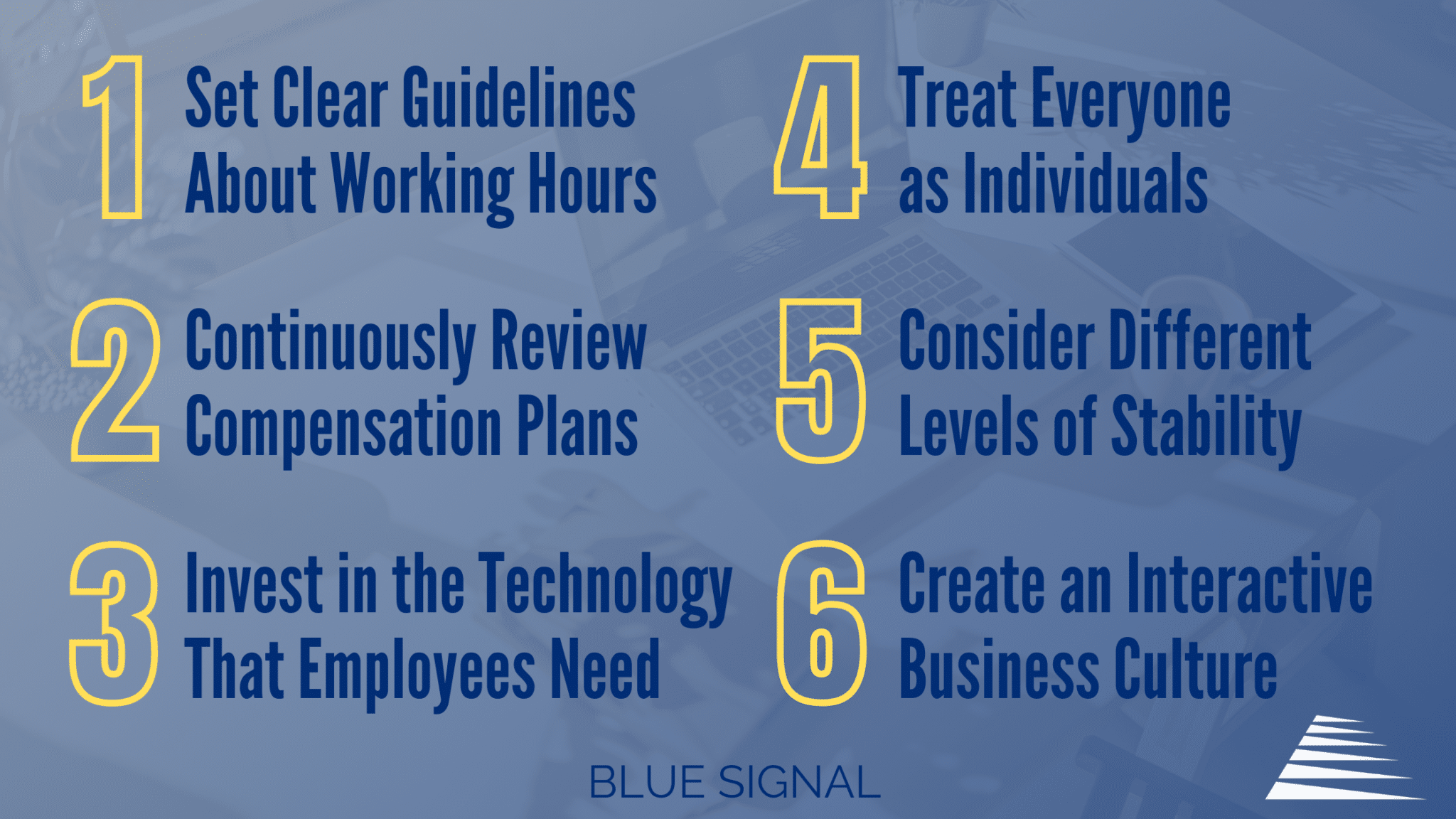
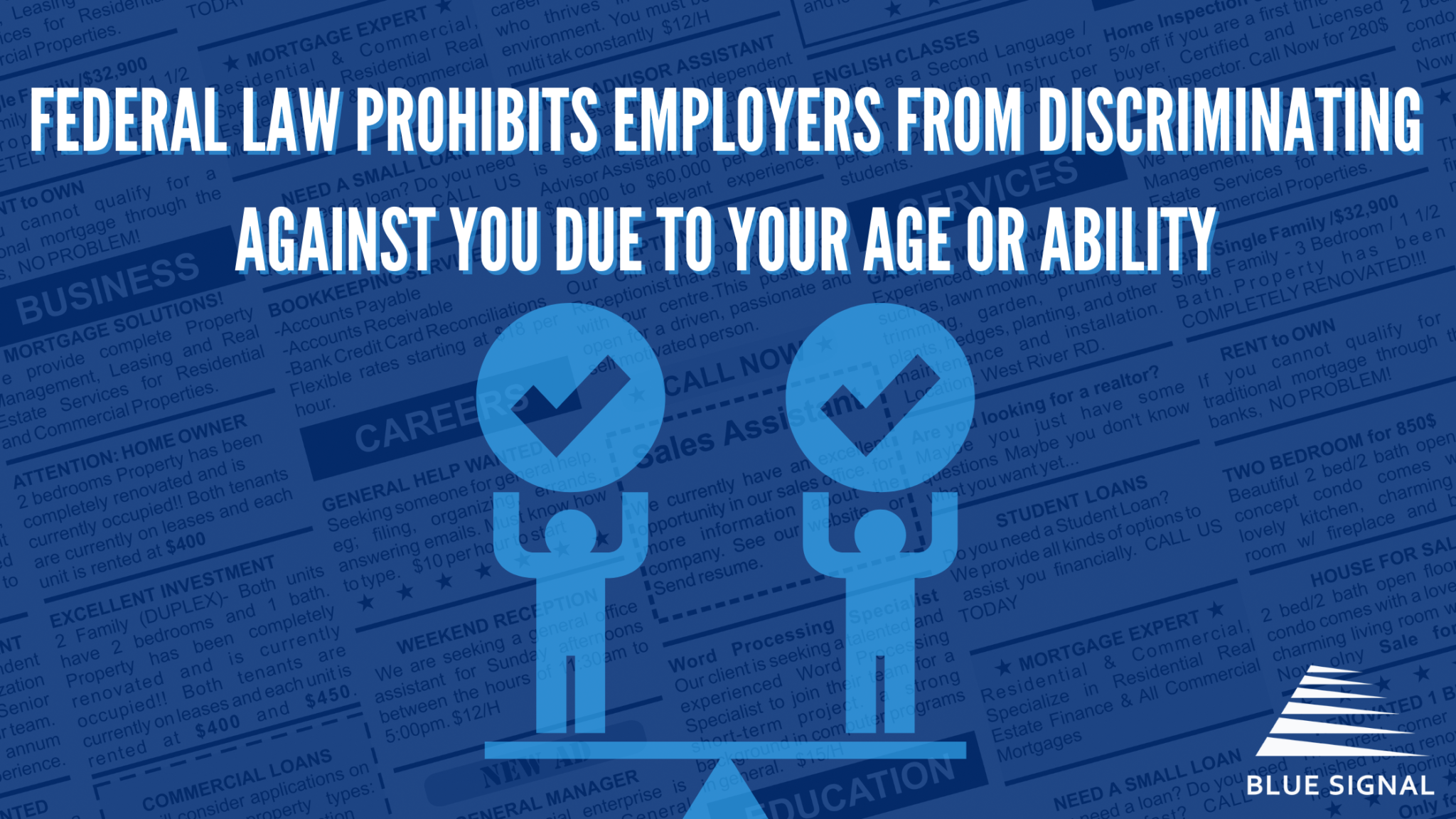
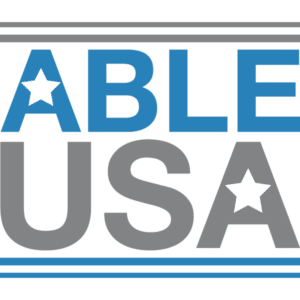 Patrick Young is an educator and activist. He believes people with disabilities must live within a unique set of circumstances--the outside world often either underestimates them or ignores their needs altogether. He created AbleUSA to offer helpful resources to people with disabilities and to provide advice on navigating various aspects of life as a person with disabilities.
Patrick Young is an educator and activist. He believes people with disabilities must live within a unique set of circumstances--the outside world often either underestimates them or ignores their needs altogether. He created AbleUSA to offer helpful resources to people with disabilities and to provide advice on navigating various aspects of life as a person with disabilities.
